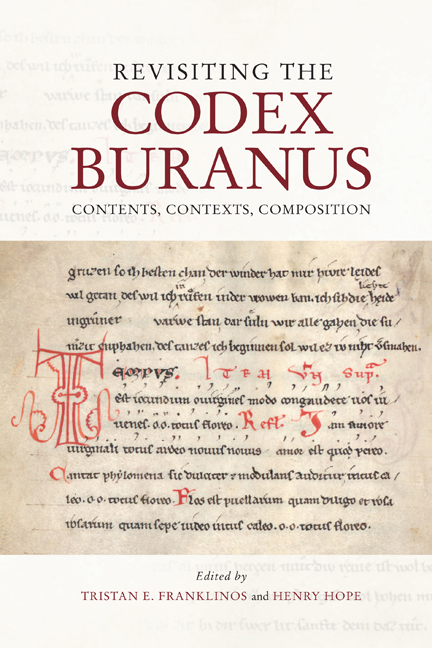Book contents
- Frontmatter
- Contents
- List of Illustrations
- Acknowledgements
- Abbreviations
- Dedication
- Introduction: The Codex Buranus – A Unique Challenge
- Chapter 1 A Modern Reception History of the Codex Buranus in Image and Sound
- Chapter 2 Parody in the Codex Buranus
- Chapter 3 Satire in the Codex Buranus
- Chapter 4 ‘Artes Amatorie Iam Non Instruuntur’: Learned and Erotic Discourse in the Carmina Burana
- Chapter 5 Classical Learning and Audience in the Carmina Amatoria: A Case-Study on CB 92
- Chapter 6 Rape, the Pastourelle, and the Female Voice in CB 185
- Chapter 7 Rethinking the Carmina Burana III: The Poetry of Peasants
- Chapter 8 Predestination and God’s Grace: The Salvific Architecture of the Religious Songs in the Codex Buranus
- Chapter 9 Revisiting the Plays of the Codex Buranus
- Chapter 10 Revisiting the Music of the Codex Buranus
- Chapter 11 Locating the Codex Buranus: Notational Contexts
- Chapter 12 Plurilingualism in the Codex Buranus: An Intercultural Reconsideration
- Chapter 13 Compilation, Contrafacture, Composition: Revisiting the German Texts of the Codex Buranus
- Afterword: multiformis armonia, scolaris symphonia
- List of Manuscripts
- Bibliography
- Index
- General Index
- Studies in Medieval and Renaissance Music
Chapter 6 - Rape, the Pastourelle, and the Female Voice in CB 185
Published online by Cambridge University Press: 16 September 2020
- Frontmatter
- Contents
- List of Illustrations
- Acknowledgements
- Abbreviations
- Dedication
- Introduction: The Codex Buranus – A Unique Challenge
- Chapter 1 A Modern Reception History of the Codex Buranus in Image and Sound
- Chapter 2 Parody in the Codex Buranus
- Chapter 3 Satire in the Codex Buranus
- Chapter 4 ‘Artes Amatorie Iam Non Instruuntur’: Learned and Erotic Discourse in the Carmina Burana
- Chapter 5 Classical Learning and Audience in the Carmina Amatoria: A Case-Study on CB 92
- Chapter 6 Rape, the Pastourelle, and the Female Voice in CB 185
- Chapter 7 Rethinking the Carmina Burana III: The Poetry of Peasants
- Chapter 8 Predestination and God’s Grace: The Salvific Architecture of the Religious Songs in the Codex Buranus
- Chapter 9 Revisiting the Plays of the Codex Buranus
- Chapter 10 Revisiting the Music of the Codex Buranus
- Chapter 11 Locating the Codex Buranus: Notational Contexts
- Chapter 12 Plurilingualism in the Codex Buranus: An Intercultural Reconsideration
- Chapter 13 Compilation, Contrafacture, Composition: Revisiting the German Texts of the Codex Buranus
- Afterword: multiformis armonia, scolaris symphonia
- List of Manuscripts
- Bibliography
- Index
- General Index
- Studies in Medieval and Renaissance Music
Summary
The pastourelle is a difficult genre for a modern audience: these songs tell, usually in the first person, of the encounter of a knight with a woman, typically a shepherdess, alone in the woods or fields. The knight will attempt to seduce the shepherdess: occasionally, he is successful; sometimes, the shepherdess drives him away. In a significant minority of songs, the knight rapes an unwilling shepherdess. The pastourelles in which rape occurs tend to trivialise this sexual violence by portraying the victim as one who receives sexual gratification and blaming her for being alone and vulnerable. At the same time, they glory in the sexual prowess of the aggressor, while also parodying his courtly words and contrasting them with his violent actions. Even if rape does not occur, the threat of sexual violence is constantly present in the pastourelle. Underlying these poems is the view, expressed by Andreas Capellanus in his De amore, that peasants make love like beasts and that a noble can thus merely ‘take’ their love. The similarities of these sentiments to what is described as ‘rape culture’ on American college campuses today are obvious and have been described by Carissa Harris. Scholarly responses to these poems often repeat tropes from modern debates, with many arguments revolving around whether the female victim really wanted to be raped. As Geri Smith notes, many scholars are all too eager to take the portrayal of the shepherdess in the pastourelle as happy or impressed after her rape at face value, ignoring the fact that anything the shepherdess says or does is mediated through the male rapist's voice: ‘even if simultaneous or after-thefact consent were not self-contradictory concepts, the pastourelle's privileging of masculine perspective and voice strongly problematises any depiction of the woman's acquiescence’. The entire pastourelle genre is deeply entwined with rape, and the attempts of some medieval authors to soften the blow of the rapes by turning the girl's resistance into a show may indicate that some of the poems’ original audiences were also uncomfortable with this situation. At the same time, the poems are infused with a misogyny that should not be downplayed.
- Type
- Chapter
- Information
- Revisiting the Codex BuranusContents, Contexts, Compositions, pp. 149 - 170Publisher: Boydell & BrewerPrint publication year: 2020

